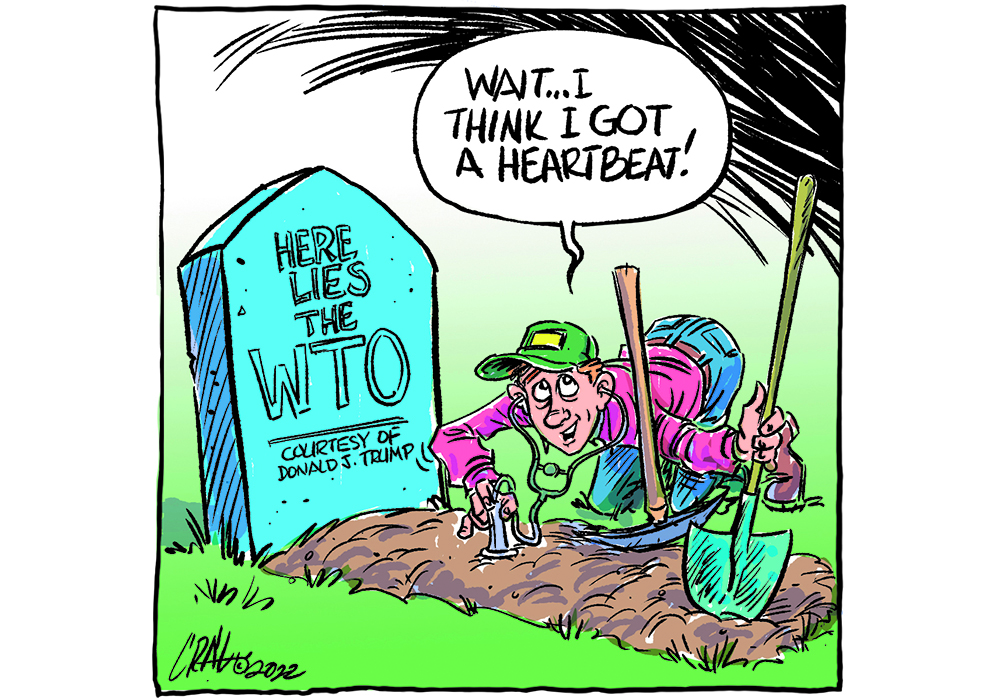The World Trade Organization lives. It hasn’t generated many headlines in recent years — the Canada-U.S. softwood lumber dispute aside — but the conclusion of the 12th Ministerial Conference in Geneva featured some welcome gains in international trade rules. It seems the WTO has been quietly rumbling along throughout the pandemic and last week saw the world’s leading trading nations come to the table for the first time in five years.
Notably, gains in sanitary and phyto-sanitary measures stand to benefit Canada in terms of grain shipments and remove some of the irritants that have plagued the industry. Further attention to a dispute settlement mechanism is also welcome.
Read Also

Budget seen as fairly solid, but worrying cracks appear
The reaction from the agriculture industry to prime minister Mark Carney’s first budget handed down November 4th has been largely positive.
The Canadian Agri-Food Trade Alliance praised recent WTO developments thusly: “Reinvigorating efforts to reform global trade in agriculture will strengthen the resilience of global supply chains, help alleviate the price pain consumers are feeling and provide farmers, food manufacturers and workers around the world with predictability and certainty.”
Let us hope that is indeed the case, tall order though it is.
A group of global agriculture and food exporters, in a joint statement, noted “a new urgency” to address the role of trade in food prices and food security and paid homage to farmers “at the front lines of sustainability, food security and economic growth.”
Many countries turned their focus inward during the pandemic. Supply chain issues and the spectre of food shortages forced many to consider greater self-sufficiency. Tariff escalation and quotas, among other barriers, were among the response.
Canada is in an enviable position vis a vis food availability but the agricultural industry is nevertheless dependent on international trade for its economic health and viability. International trade rules and a way to settle disputes are vital if the country is to continue its level of production and its supply of food and commodities to other countries, including the world’s hungry.
The WTO’s dispute resolution mechanism — the same one that eventually brought the harmful County of Origin Labelling (COOL) dispute to heel in Canada’s favour — was crippled when former U.S. President Donald Trump deemed the WTO to be a “broken” and “horrible” body. His real beef likely had more to do cases when the U.S. was not the victor in trade disputes, though Uncle Sam generally wins more trade spats than it loses.
But, using those occasional losses as an excuse, his administration blocked the appointments needed for the WTO’s appellant body, which has effectively stalled any appealed decision since 2019. Members could get rulings on disputes but were unable to get mediation or final decisions they could use to implement counter measures.
As of last week’s meeting in Geneva, it appears the United States may allow appointments to the appellant panel or reform the system so no single country can hold it hostage.
Some 164 countries are participants in the WTO and that is why so much of the world’s international trade is covered by the nearly 30-year-old relationship.
WTO mechanisms have also allowed smaller countries to band together with larger ones on common issues, such as agricultural commodities. As an example, India has recently been using the global food crisis to suggest it should be allowed to further subsidize its production of grains and oilseeds. However, history shows that could be used to dump wheat stocks onto the world market, driving prices down to the detriment of other countries. More details on this can be found on pages one and eight of this issue.
Canada is a beneficiary of fair trading systems and farmers should welcome a a global return to the trade table through a revitalized WTO.
Karen Briere, Bruce Dyck, Barb Glen and Mike Raine collaborate in the writing of Western Producer editorials.















